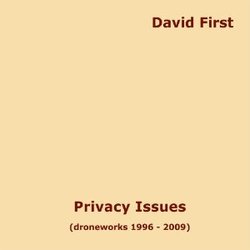 Listen to this eleven-minute excerpt, and don’t bother clicking unless you’ll commit to the whole thing. It’s the ending of David First’s Pipeline Witness Apologies to Dennis, and I hope the mp3 format doesn’t dumb it down too much. First’s new three-disc set Privacy Issues, on Phill Niblock’s XI label, is the greatest new recording I’ve heard in awhile, and I’ve been relistening to it every few days. It’s all drone-based works from the last 14 years. David’s work is sometimes (amazingly) solo and sometimes ensemble; I picked an ensemble piece here thinking it might have a little more profile over computer speakers, but he can make just as much noise by himself. It’s all music gradually going in and out of tune. You could say that Niblock’s music is the same, and it is, but while Niblock’s music is slow and marvelous and creeps up on you unawares if you have the patience, David’s is considerably more dramatic and high energy. You don’t have to wait for it, it’ll come get you. He’s always been really interested in the liminal area between consonance and dissonance, and the amazing places in his music are those in which you suddenly realize where the music’s going, and you can’t believe it’s about to get there – buzzy and jangling for a long time, but then it starts to slide into tune and this gloriously consonant sonority emerges that you couldn’t imagine was in there. It really feel symphonic to me, like a symphony stripped down to just its harmony, and blurred; Carl Nielsen comes to mind, because Nielsen has these great harmonic clashes in which some major key wins out in the end, and it does in First’s music too, just far more gradually. I wore out three laptops trying to make First famous via the Village Voice, and I’m thrilled that after a long silence he’s got this incredible CD set out, every piece a knockout. I wish I could write music like this, but I can’t. I tried. I just can’t make anything work without a melody to it, but some of First’s passages almost sound like you could analyze them with Roman numerals, except for the buzzy parts in-between. If I were a young composer today this would be my Stockhausen, except that First is already older than Stockhausen was when I was a teenager. In a sane world, grad schools would be hosting conferences on this music, but everything’s so conservative these days that it’s more fringe now than it was 20 years ago.Â
Listen to this eleven-minute excerpt, and don’t bother clicking unless you’ll commit to the whole thing. It’s the ending of David First’s Pipeline Witness Apologies to Dennis, and I hope the mp3 format doesn’t dumb it down too much. First’s new three-disc set Privacy Issues, on Phill Niblock’s XI label, is the greatest new recording I’ve heard in awhile, and I’ve been relistening to it every few days. It’s all drone-based works from the last 14 years. David’s work is sometimes (amazingly) solo and sometimes ensemble; I picked an ensemble piece here thinking it might have a little more profile over computer speakers, but he can make just as much noise by himself. It’s all music gradually going in and out of tune. You could say that Niblock’s music is the same, and it is, but while Niblock’s music is slow and marvelous and creeps up on you unawares if you have the patience, David’s is considerably more dramatic and high energy. You don’t have to wait for it, it’ll come get you. He’s always been really interested in the liminal area between consonance and dissonance, and the amazing places in his music are those in which you suddenly realize where the music’s going, and you can’t believe it’s about to get there – buzzy and jangling for a long time, but then it starts to slide into tune and this gloriously consonant sonority emerges that you couldn’t imagine was in there. It really feel symphonic to me, like a symphony stripped down to just its harmony, and blurred; Carl Nielsen comes to mind, because Nielsen has these great harmonic clashes in which some major key wins out in the end, and it does in First’s music too, just far more gradually. I wore out three laptops trying to make First famous via the Village Voice, and I’m thrilled that after a long silence he’s got this incredible CD set out, every piece a knockout. I wish I could write music like this, but I can’t. I tried. I just can’t make anything work without a melody to it, but some of First’s passages almost sound like you could analyze them with Roman numerals, except for the buzzy parts in-between. If I were a young composer today this would be my Stockhausen, except that First is already older than Stockhausen was when I was a teenager. In a sane world, grad schools would be hosting conferences on this music, but everything’s so conservative these days that it’s more fringe now than it was 20 years ago.Â
Kyle Gann on music after the fact
